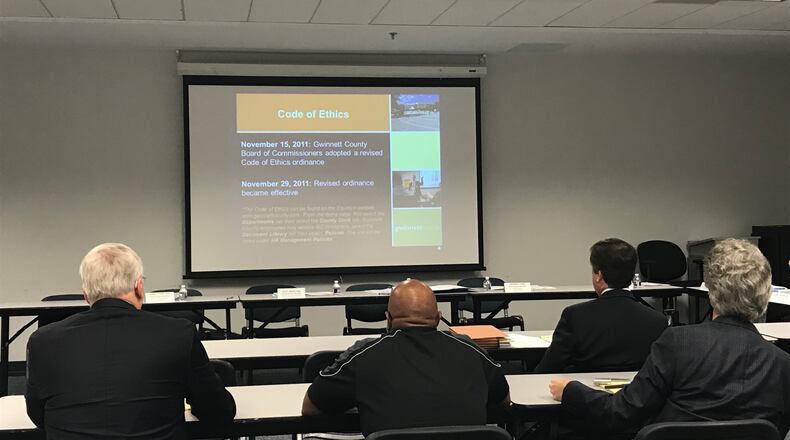Gwinnett commissioners on Tuesday voted to change the county’s ethics ordinance, limiting the ethical violations that would result in hearings and narrowing who can accuse someone of an ethical breach.
The changes come after two county commissioners, Tommy Hunter and Marlene Fosque, were the subject of ethics complaints for their speech by people who lived outside Gwinnett County.
Hunter was reprimanded in 2017 for derogatory Facebook posts he made about Democrats and then-Rep. John Lewis. The complaint against Fosque was for comments she made about an anti-illegal immigration activist in a public meeting and was dropped in 2020.
Hunter has sued the county in federal court, claiming the punishment violated his right to free speech.
The changes to the ordinance mean statements like those that led to Hunter’s and Fosque’s hearings would no longer be punishable through the ethics ordinance.
The new version better defines the ethical standards that are subject to ethics board hearings, county attorney Mike Ludwiczak told commissioners. They separate aspirational statements about ethical behavior from enforceable ethics provisions, like disclosing confidential information or threatening officials or employees.
“In order to proceed to a hearing, the complaint now has to allege a violation of one of those specific standards,” Ludwiczak said.
The new ordinance also limits those who can make a complaint to any county resident, any county employee or any business with a physical presence in the county or that transacts business with the county.
Other changes include a $250 per day payment for members of the ethics board and the addition of an oath of office for board members. And it says complaints can’t be processed or filed once someone is out of office or no longer employed by the county.
David Will, an attorney who chaired the ethics board for the two most recent cases, said he thought Gwinnett officials had seen the effects of having a broad ordinance, and decided to change its focus to be more enforceable. He was in favor of many of the changes, but thought county officials should still be subject to complaints even after they left office or employment.
Some experts had concerns about parts of the ordinance, like Carla Miller, the president of CityEthics, who said she wished the county hadn’t restricted who can make a complaint.
But others said even with some outstanding concerns, the changes were largely beneficial.
Edward Queen, a faculty member at the Emory University Center for Ethics, said the proposed changes help make a murky ordinance clearer by focusing on compliance.
“It’s as good a rewrite as I think they can make,” he said. “They’re going to learn as they do.”
About the Author
Keep Reading
The Latest
Featured



